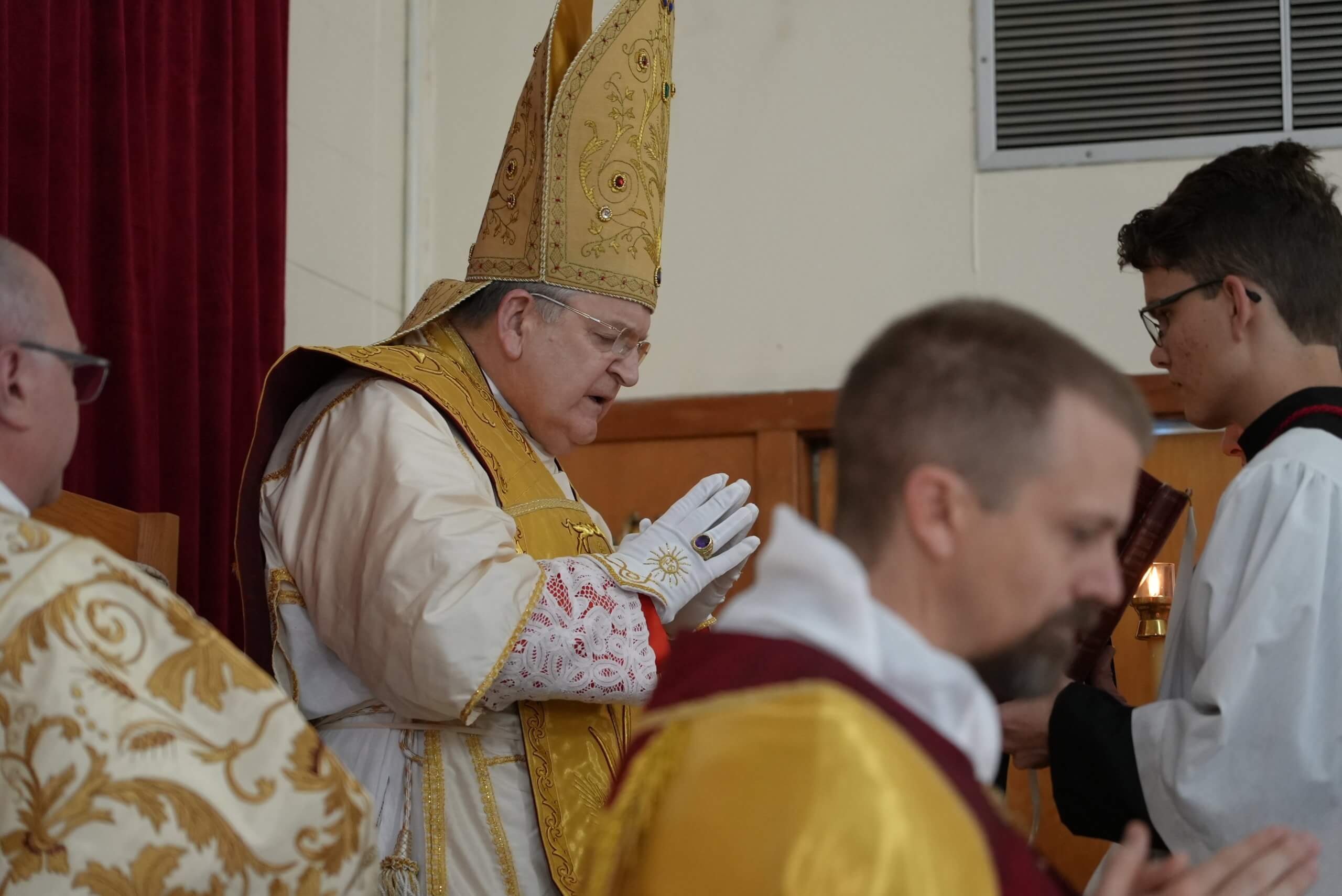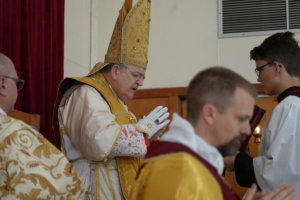FULL TEXT Cdl. Burke’s Latin Mass Sermon for Christ the King
Epiphany of Our Lord Catholic Church 2510 E. Hanna Avenue Tampa, Florida 30 October 2022 Col 1, 12-20 Jn 18, 33-37 Sermon In the name of the Father, and of the Son, and of the Holy Ghost. Amen. It is […]


Epiphany of Our Lord Catholic Church 2510 E. Hanna Avenue
Tampa, Florida
30 October 2022
Col 1, 12-20 Jn 18, 33-37
Sermon
In the name of the Father, and of the Son, and of the Holy Ghost. Amen.
It is a source of great joy for me to offer in your church the Pontifical Mass, according to the More Ancient Usage of the Roman Rite, on the Feast of the Kingship of Our Lord Jesus Christ. I thank Bishop Gregory Parkes for his warm welcome to the Diocese of St. Petersburg. Bishop Parkes has expressed to me his regret at not being able to be present for the Pontifical Mass today and has asked me to convey to you his warmest greetings. I also thank Father Edwin Palka and all who have worked so diligently to prepare everything for the Pontifical Mass today. I am offering the Holy Mass for your intentions.
The Kingship of Christ, which we solemnly acclaim today, is best understood through His dialogue with the Roman Governor Pontius Pilate before Pilate condemned Him to death by crucifixion. When Pilate questioned our Lord about His kingship, our Lord did not deny that He is a king. He explained, however, the unique nature of His kingship, namely a kingship which “does not belong to this world” (Jn 18, 36). It is the reign of God the Son Who has come into the world “to testify to the truth,” (Jn 18, 37) freeing all mankind from slavery to the deceptions by which Satan would lead us into sin and eternal death. Christ responded to Pilate with complete confidence in God the Father’s promise of salvation, of the victory over Satan, which the Father had sent Him into the world to accomplish.
Christ the King reigns forever in glory from the Cross. From His Royal Heart which He permitted the Roman solider to pierce at His death on the Cross, He never ceases to pour forth into our hearts the sevenfold gift of the Holy Spirit, the Spirit of Truth. Thus, His witness to the truth for the salvation of all mankind never ceases. In short, in Christ is realized the right order of all things, the union of heaven and earth, as God the Father intended from the beginning. Christ conquers the disorder introduced into the world by the rebellion of our First Parents against the will of God for us and for the world. By disobeying God, our First Parents, according to the deception introduced into their minds and hearts by Satan, thought to become God. The obedience of God the Son Incarnate reestablishes, restores, the original communion of man with God and, therefore, peace in the world.
It is the Mystery of Faith, which teaches us the Kingship of Christ. We consider the incomparable reality of Christ – the two natures, human and divine, in the one person of God the Son – under different aspects, referring to Christ by various titles, for example, Son of God and Son of Mary, Eternal High Priest, Divine Teacher, and Eternal Lawgiver. In fact, the mystery of the Redemptive Incarnation of God the Son is so great that we can only attempt to understand it by analogy, by the use of various titles which point to the incomparable reality but never fully express it. Pope Pius XI, in the Encyclical Letter, Quas Primas, by which he established “the feast of the Kingship of our Lord Jesus Christ to be observed yearly throughout the whole world,”[1] wrote to the Bishops of the world, asking them “to see that sermons are preached to the people in every parish to teach them the meaning and the importance of this feast, that they may so order their lives as to be worthy of faithful and obedient subjects of the Divine King.”[2] The liturgical observance of the Feast of the Kingship of Our Lord Jesus Christ, in fact, gives the grace of a more perfect obedience to Him Who alone is our Savior, Him Who alone is “the way, the truth, and the life” (Jn 14, 6).
In the Holy Eucharist we now celebrate, we acclaim Christ the King of our lives and of our world, and we offer Him the worship which He alone, among all kings, merits. In the words of Saint Paul in today’s Epistle, we are filled with gratitude to God the Father Who “has delivered us from the dominion of darkness and transferred us to the kingdom of his beloved Son, in whom we have redemption, the forgiveness of sins” (Col 1, 13-14). By our participation in the Eucharistic Sacrifice, by the giving of our hearts into the Eucharistic Heart of Jesus, we acknowledge that “all the fullness of God” (Col 1, 19) is in Christ. What is more, we acknowledge that, through Christ’s Sacrifice on the Cross, which He makes sacramentally present in the Eucharistic Sacrifice, God has reconciled “to himself all things, whether on earth or in heaven, making peace by the blood of his cross” (Col 1, 20).
As we lift up our poor and sinful hearts to the glorious-pierced Heart of Christ the King in His Eucharistic Sacrifice, He reaches down to draw us into His glorious Royal Heart, in which He purifies us of sin and gives us rest and strength. The Kingship of Christ clearly extends to the individual human heart, calling forth the obedience which frees the individual to become all that God has created him or her to be.
In his first Encyclical Letter, Redemptor Hominis, Pope Saint John Paul II referred to the reality of Christ’s Kingship in the human heart. Taking up the discussion of the vocation of man in Christ, especially as it was treated in the Second Vatican Ecumenical Council, he gave particular attention to its kingly nature. Referring to the Council’s teaching, he wrote:
… [O]ne element seems to stand out in the midst of all these riches: the sharing in Christ’s kingly mission, that is to say the fact of rediscovering in oneself and others the special dignity of our vocation that can be described as “kingship.” This dignity is expressed in readiness to serve, in keeping with the example of Christ, who “came not to be served but to serve.” If, in the light of this attitude of Christ’s, “being a king” is truly possible only by “being a servant” then “being a servant” also demands so much spiritual maturity that it must really be described as “being a king.” In order to be able to serve others worthily and effectively we must be able to master ourselves, possess the virtues that make this mastery possible. Our sharing in Christ’s kingly mission – his “kingly function” (munus) is closely linked with every sphere of both Christian and human morality.[3]
The Kingship of Christ over human hearts is not some ideal to which all are called but only a few can attain. It is, rather, a reality of divine grace which helps even the weakest and the most tried among us to attain a heroic degree of virtue, if only he or she cooperates with divine grace. The image of the Royal Heart of Jesus, His Most Sacred Heart, reminds us to seek always in Him, above all, in the Holy Eucharist, the inspiration and strength for our daily living which is rightly called the royal way of holiness of life.
Celebrating the Solemnity of Christ the King, let us renew our devotion to His Royal Heart. Let us keep before our eyes throughout each day, the image of Christ the King Who reigns in our lives from His glorious pierced Heart. Throughout each day, let us place our hearts totally into His Heart, as we do most perfectly in the Eucharistic Sacrifice. Let us ask to be purified of anything in our lives which prevents His truth from enlightening every fiber of our being, every corner of our world. Through our devotion to the Sacred Heart of Jesus, may Christ the King reign in our hearts and in our homes. If the image of the Sacred Heart of Jesus has already been enthroned in your home, take time today to pray before the image, asking that Christ the King may always reign in your heart and in your home. If the Sacred Heart of Jesus has not yet been enthroned in your home, begin today the preparations for the Enthronement.
Christ the King reigns in our hearts from His glorious Sacred Heart, pierced for our sins. From His Royal Heart, He unceasingly pours forth the divine life of the Holy Spirit into our hearts. Let us lift up our hearts to Christ our King. One in heart with His Royal Heart, may we be faithful witnesses to the truth which makes us free to follow Him on the royal way of holiness of life, of pure and selfless love of God and of one another, especially of our brothers and sisters in most need.
In the name of the Father, and of the Son, and of the Holy Ghost. Amen.
Raymond Leo Cardinal BURKE
[1] “… festum D. N. Iesu Christi Regis …, quotannis, ubique terrarum agendum.” Pius PP. XI, Litterae Encyclicae Quas primas, “De Festo Domini Nostri Iesu Christi Regis constituendo,” 11 Decembris 1925, Acta Apostolicae Sedis, 17 (1925) 607. [QP]. English translation: http://w2.vatican.va/content/pius-xi/en/encyclicals/documents/hf_p- xi_11121925_quas-primas.html, pp. 10-11, no. 28. [QPEng].
[2] “… ad populum e singulis paroeciis contiones, quibus is de rei natura, significatione et momento accurate monitus atque eruditus, sic vitam instituat ac componat, ut iis digna sit, qui divini Regis imperio fideliter studioseque obsequuntur.” QP, 608. English translation: QPEng, p. 11, no. 29.
[3] “… [I]nter abundantiam istam doctrinarum una pars profecto eminere videtur: participatio regalis muneris Christi, quatenus unusquisque detegit in se et in aliis peculiarem vocationis nostrae dignitatem, quae «regalitas» potest nominari. Haec quidem dignitas monstratur in prompta serviendi alacritate secundum Christi exemplum, qui «non venit ministrari sed ministrare». Si igitur secundum illum Christi habitum vel affectum aliquis «regnare» proprie valet dumtaxat «serviendo», simul postulat illud «serviendi» officium talem maturitatem spiritualem, quae dicenda sit prorsus signifcare aliquem «regnare». Ut quis ideo digne efficaciterque ceteris inserviat, oportet is dominetur in semet ipsum possideatque virtutes, quae permittant, ut ita dominetur. Nostra participatio regalis missionis Christi – illius quidem «muneris regalis» – arcto vinculo cohaeret cum omni regione doctrinae moralis, tam chistianae quam etiam humanae.” Ioannes Paulus PP. II, Litterae Encyclicae Redemptor Hominis, “Pontificali eius Ministerio ineunte,” 4 Martii 1979, Acta Apostolicae Sedis, 71 (1979), 316, n. 21. English translation: Pope John Paul II, Encyclicals (Trivandrum, Kerala, India: Carmel International Publishing House, 2005), p. 1116, no. 21.













